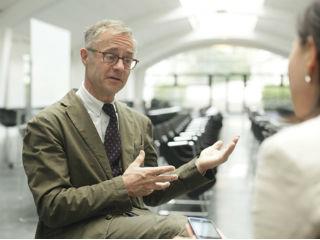Climate Action caught up with Philippe Desfossés, Chief Executive Officer of ERAFP and Vice Chair of IIGCC, on scaling up low carbon investment and his participation in the Sustainable Investment Forum

A new world has been emerging in the last 3 or 4 years. First of all, more and more pension funds are realising that at some point, their fiduciary duty requires their taking stock of climate change. If climate change is a risk, how can you justify not paying attention to that risk? You could be brought to court by a contributor that will realise some day that you knew there was a risk and you did nothing to mitigate it. Three years ago, the Risky Business Report clearly stated that climate change was a risk for business.
Firstly, could you please introduce ERAFP and how you go about tackling environmental issues?
ERAFP is a medium-sized pension fund, which manages 28 billion euros. Managing 28 billion euros already makes ERAFP a universal owner, which means that we are invested in all the sectors of the economy. As a pension fund, we have really long-term commitment. Someone who is twenty today, joining the scheme, will still be in our books in 60 years. It means that in every investment we make, we have to take into account the sustainability of the assets. In the end of the day, these assets will be the ultimate guarantee of the benefit we pledge to pay each time we get a contribution from our contributors. By definition, pension funds think long-term. When you think long term, each time you invest, you are to wonder whether or not this precise asset you are buying is resilient to a 2 degree world. If you start thinking that way, you’ll realise that many things you were taking for granted are not that granted and that assets you hold in your balance sheet might already be stranded.
A new world has been emerging in the last 3 or 4 years. First of all, more and more pension funds are realising that at some point, their fiduciary duty requires their taking stock of climate change. If climate change is a risk, how can you justify not paying attention to that risk? You could be brought to court by a contributor that will realise some day that you knew there was a risk and you did nothing to mitigate it. Three years ago, the Risky Business Report clearly stated that climate change was a risk for business.
ERAFP started measuring the carbon footprint of our portfolios four years ago. As we all know, you don’t manage what you don’t measure, so measuring is the first step. After that, we decided to decarbonise one of our portfolios, leveraging the expertise of one of our asset managers, Amundi, and we started trying to encourage asset managers to propose different ways of decarbonising. In order to do so, we launched an initiative with amLeague, which is a virtual platform where you can run semi-portfolio, and you can show how you decarbonise it. We set a limited number of criteria – or KPIs – to assess the value proposal of each of these asset managers. We launched this initiative a bit more than one year ago, and at the end of the process, we decided to invest in a fund of La Française AM because we were convinced by the way they had been running this portfolio.
There are many things you can do, but I want to emphasise the fact that nothing will happen without harnessing the power of the market, and without making it possible for long-term investors to play their role, which is to provide the needed long-term financing for the 2 degree transition.
What do you find are some of the key challenges to scaling up low carbon investment, from a Pension Fund perspective?
The first thing we need is a good regulatory framework. Most politicians don’t understand that the most important thing is to design the right regulatory framework. It is much more important than finding the 100bn€ pledged by developed countries. The challenge is to bring in pension funds that are managing trillions. It is a difference of scale! As the Vice-Chair of IIGCC, I can tell you that the members of the IIGCC all together represent 19 trillion euros. We need to provide those people with the right incentives, for them to make each investment decision taking into account their resilience to a 2C world. The first thing that should be done is to stop all remaining of subsidies in fossil fuels.
The second thing we need is a playing field where prices are not distorted, and we unfortunately know that the biggest market failure of all times, as Barack Obama sayd, is the lack of price on carbon. Europe thinks that fixing the ETS is enough. I doubt it, as it has never worked, and I doubt that what is proposed now could make it work. Almost 50 per cent of emissions are out of the scheme, which is already a very bad start. More and more institutional investors, especially pension funds, think that it would be much more efficient just to put a tax on fossil fuels. It would be commensurate to the CO2 content of the fossil fuel as there are dirty and less dirty fossil fuels. People are rational. If gas is cheap, you will take your car. If gas is more expensive, you will take a carpool, or even use mass public transportation.
There are already good examples of carbon pricing: there is Sweden or British Columbia. In the US, the Conservative Case for Carbon Dividends which was developed by the Republican Party, is suggesting to introduce this kind of mechanisms in the State: establishing a border carbon tax, in order to level the playing field and stop products from being imported for bad reasons, meaning carbon arbitrage; it could be complemented by a tax on the American market itself. Recycling the proceeds of those taxes by sending back to the people the same amount of money – some sort of voucher or check. $2,000 for every American household for example, would make that “taxation” – which would not be called tax – palatable; it would be neutral. This is what we need.
The third thing we need is good governance for pension funds. We need trustees who have a minimum level of expertise and enough time to their mandate. We also need Board to be less short termist.
You also are Vice-Chair of the IIGCC. Could you tell us a bit more about the goals of this organisation and how it ties in with ERAFP’s activities?
IIGCC is an organisation composed of European pension funds and European asset managers. Our sister organisation in the States is Ceres. We want to make politicians understand that nothing will be achieved without us, because we have the money and we are the owners. The very moment when those people will understand that, we can start to address the real issue. How can we redirect the money to the right place? Now, there are many incentives that encourage pension funds and institutional investors to allocate this capital to the wrong places, to the wrong assets.
*Philippe will be addressing the topic of scaling low carbon investment further at the Sustainable Investment Forum next September in New York




 By: N. Peter Kramer
By: N. Peter Kramer

